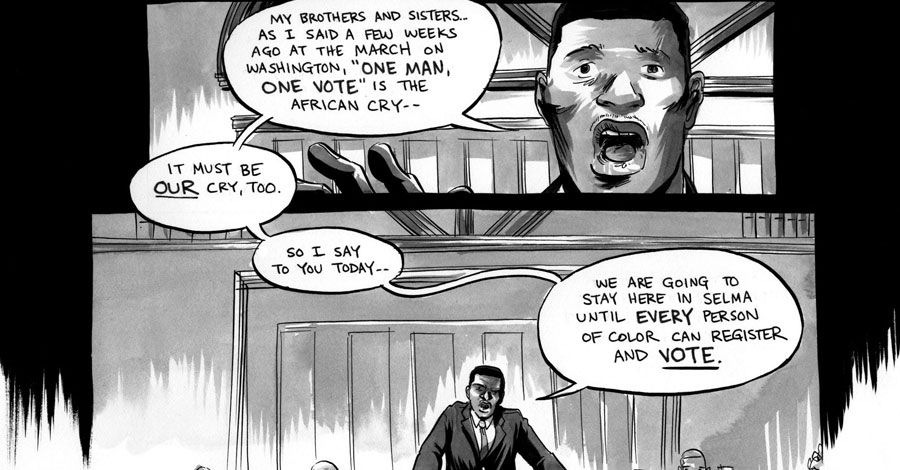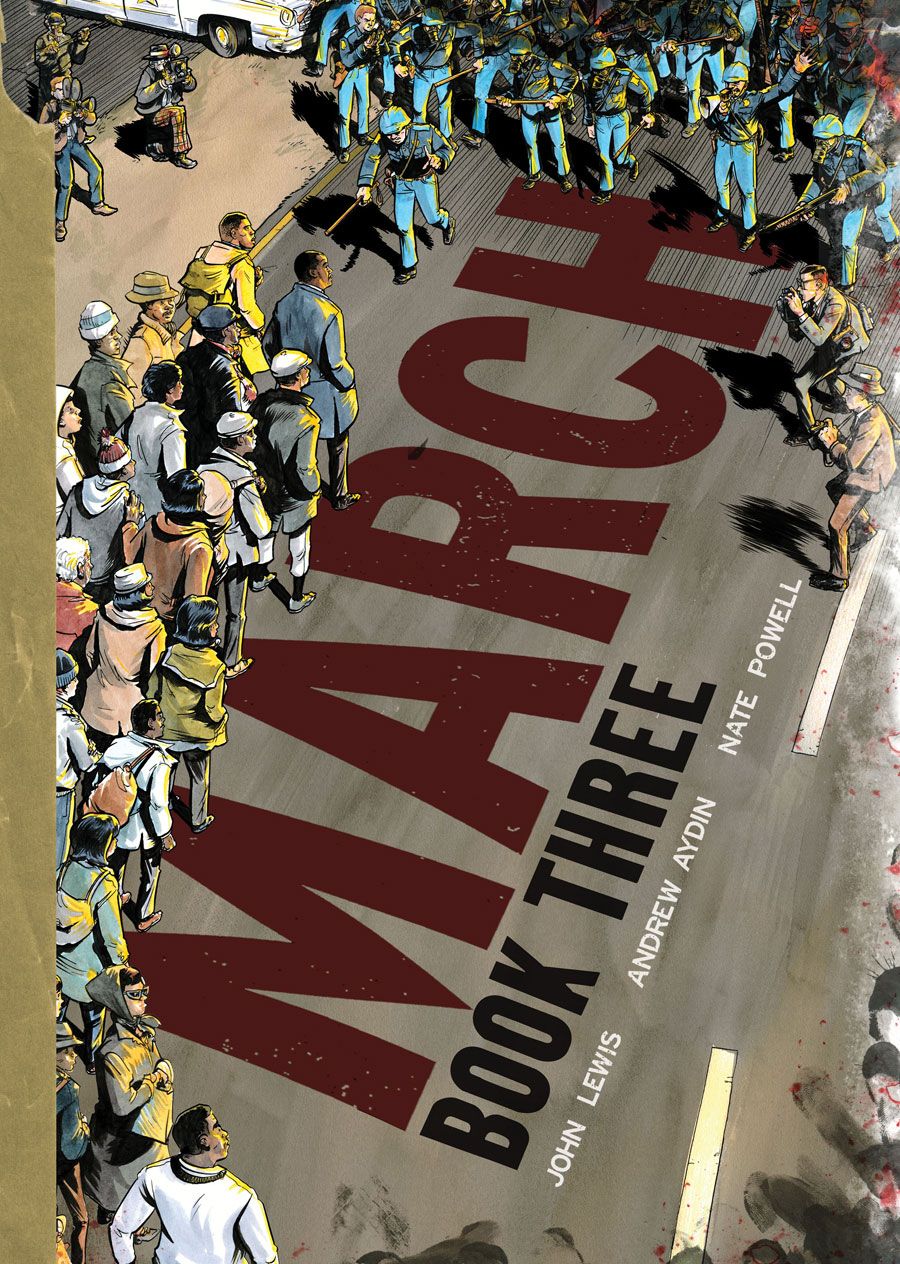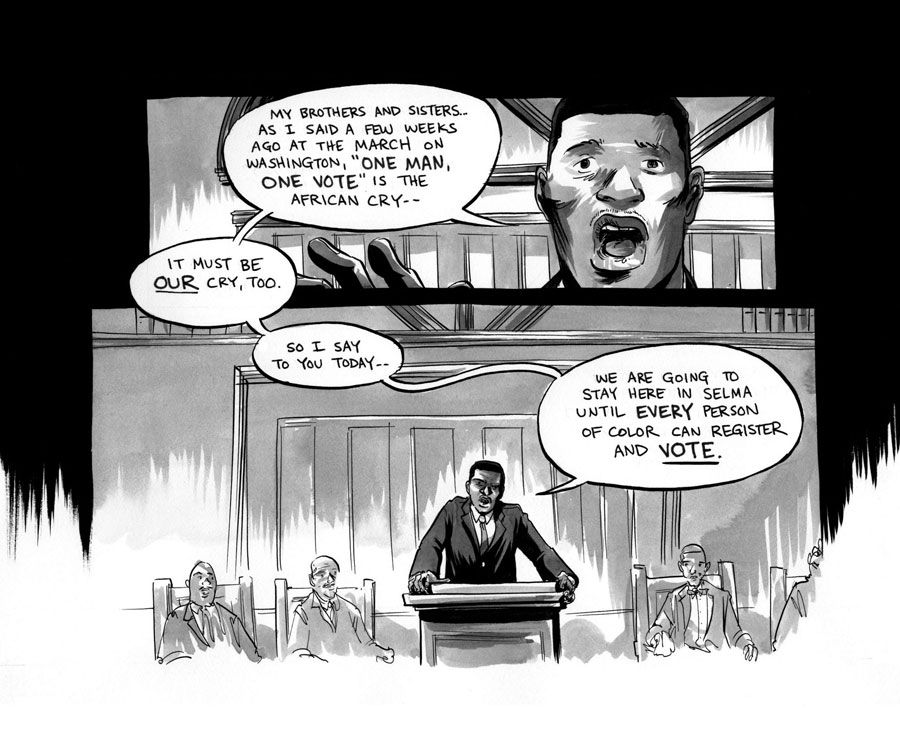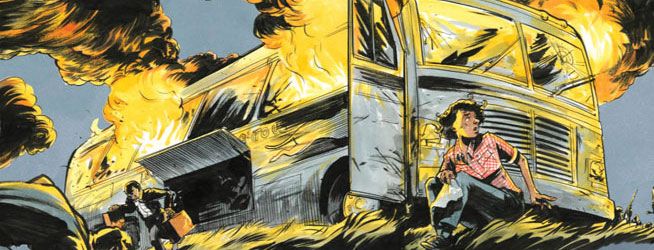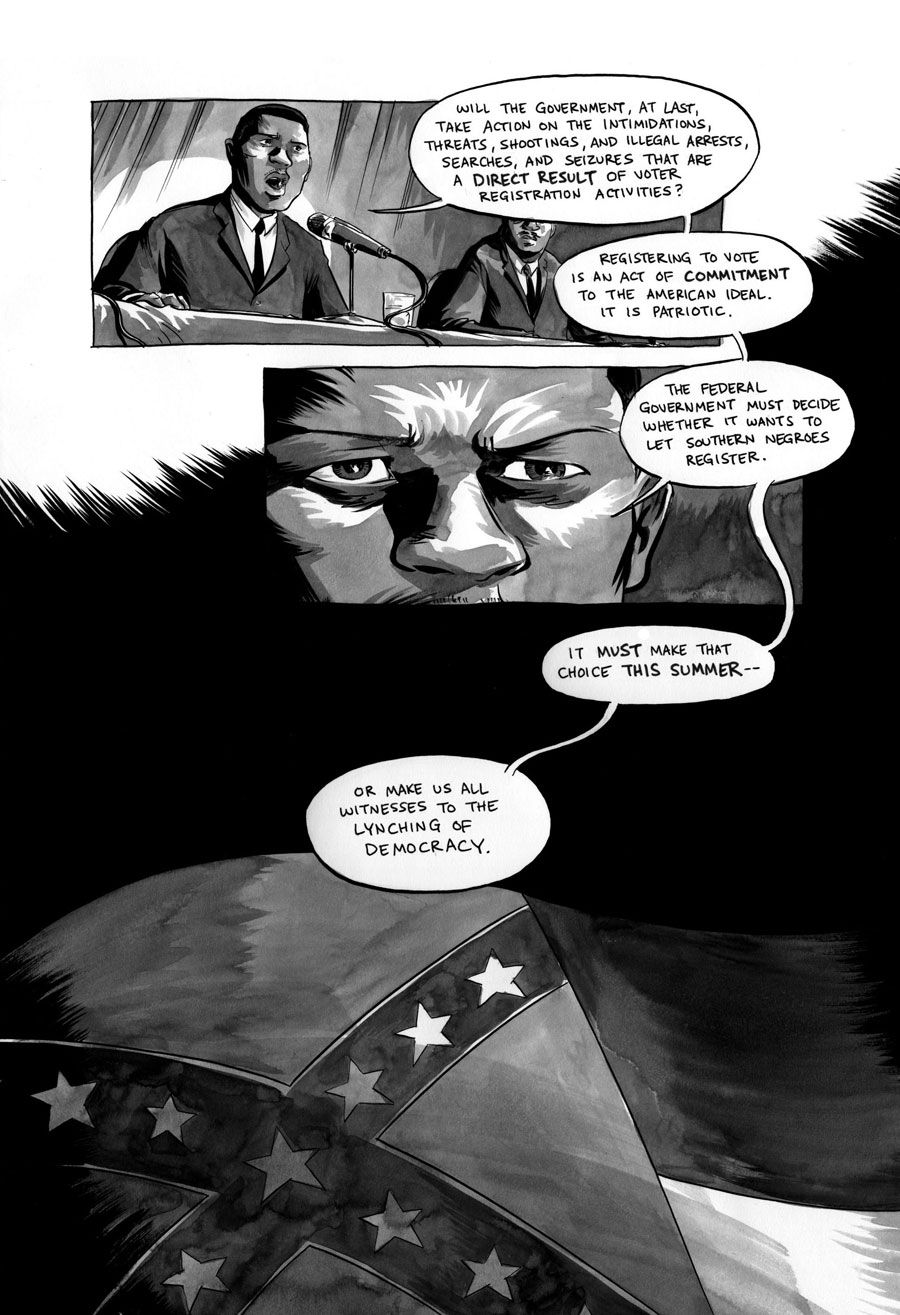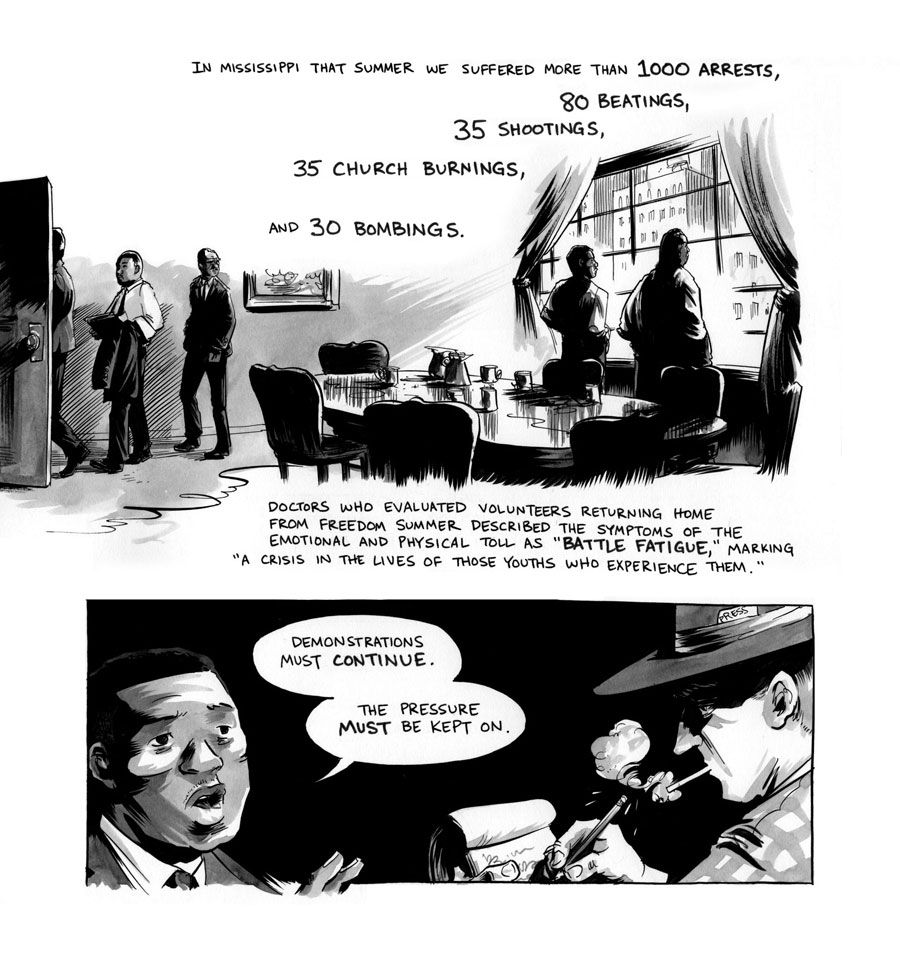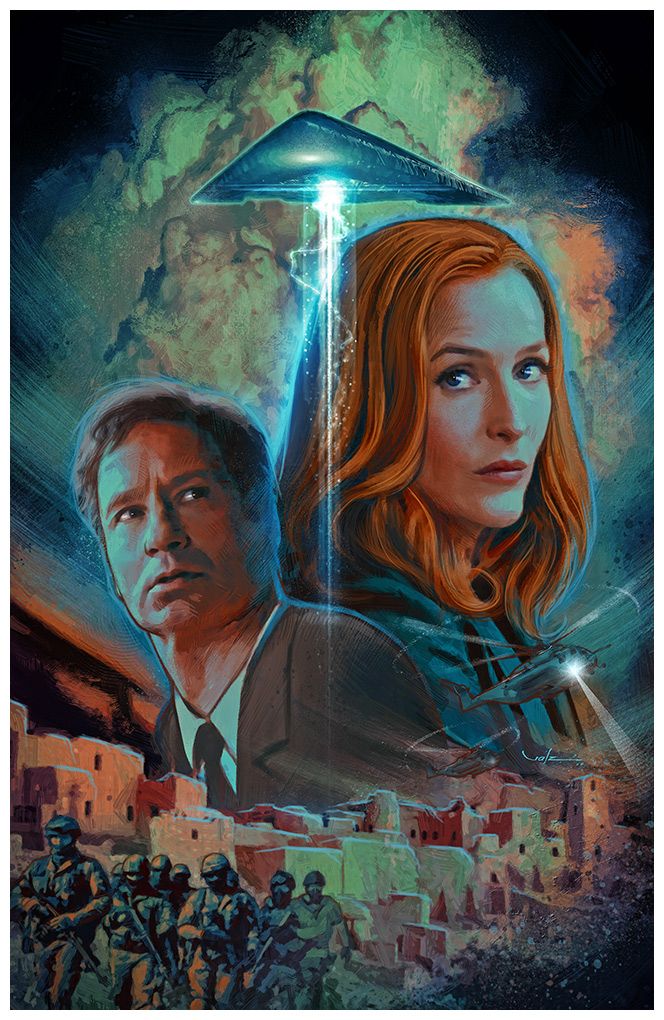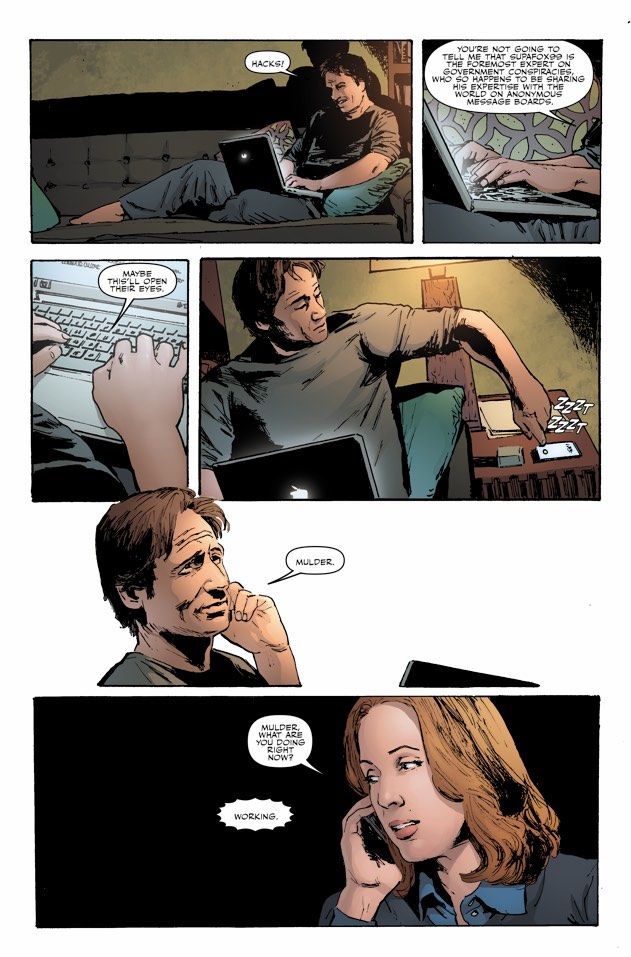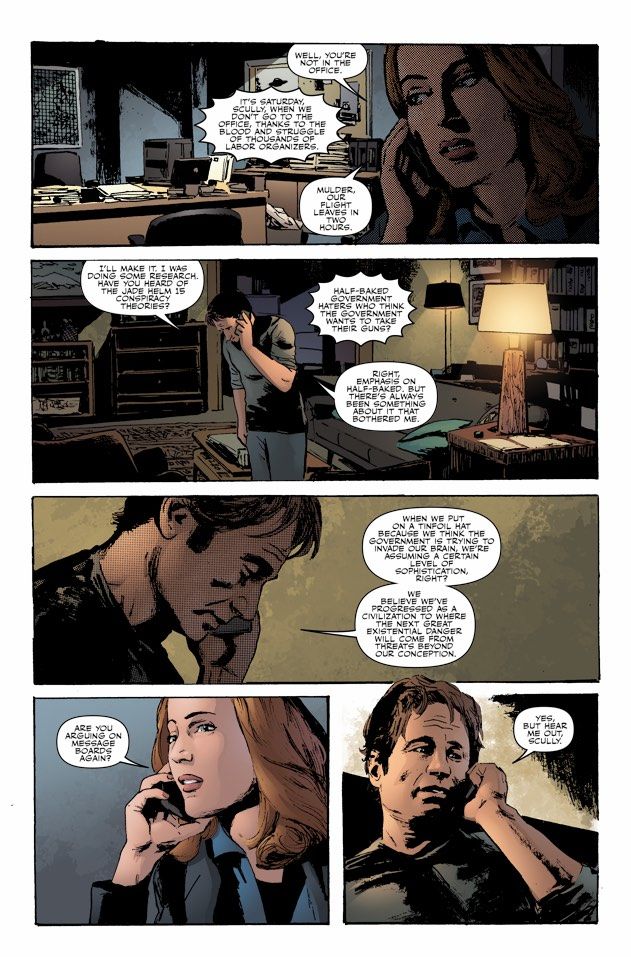Andrew Aydin is currently the Digital Director and Policy Advisor to Congressman John Lewis, but most people know him as the co-author of "March," alongside Congressman John Lewis and artist Nate Powell. The first two books were bestsellers, as well as recipients of the Robert F. Kennedy Book Award Special Recognition and the Coretta Scott King Book Award. The book has recently been added to the Social Studies curriculum by the New York City School District, is in development as an animated series, and just won an Eisner Award for Best Reality-Based Work at 2016's Comic-Con International.
RELATED: Rep. John Lewis Brings "March" to a Close at SDCC
"This is a long way from the Marriott lobby," Andrew Aydin said as we sat down in Hartford, CT to discuss his comics career. Aydin and I first met more than three years ago in that hotel lobby, before "March: Book One" was released; this time, we were in Hartford, at the Harriet Beecher Stowe Center, where he was scheduled to give a talk and present the Student Stowe Prize. We sat in an empty room after lunch to talk about "March," what it meant to him to write IDW Publishing's upcoming "X-Files Annual," and his upcoming work on "Bitch Planet."
CBR News: How have things been? How is life after finishing the book?
Andrew Aydin: It's weird. "March: Book Three" is done, and it's at the printer right now. "March" is this very personal thing that, for a very long time, had only existed in my back pocket. Now that it is the property of so many people -- creators who have participated, and people who have participated as teachers, or event hosts, or librarians -- it's a little bittersweet. I had this idea -- it was basically the biggest dream I'd ever had for myself. It came true. Now it's done. I cried that day I finished, because this was my purpose. No matter what I was going through at the time, I always had "March." I always had something to do. That carried me for eight years. Now I feel a little lost. The Congressman and I might do another book, but it won't be "March." It's a hell of a thing to get what you wanted. [Laughs]
I wanted to make a book and do all this amazing stuff -- and then it happened. And now, it's over. I'll always tour and I'll always talk about it, but the work that I enjoyed is over. Looking back on it, you start to dissect why it happened. What was it that pushed me to work this hard? What was it that gave us this break? What was it that made it reach into someone's subconscious and stay here? I don't think there's a single answer to any of it. I hope it's a model for other ideas, other projects that are outside the box, other kids who get laughed at for their ideas.
Last time we spoke, you talked about all the research and triple-checking everything and all that that required.
I hope that people understand the depth of research that went into making sure "March" tells as complete a story as possible of this time. I've seen other projects that have talked about this time, and they always fall short a little bit. They're entertaining, but they miss the depth that they could achieve. Having had years to think about this, there was a lot of moments that I'd seen people leave out that I went, "That has to be in there. It'll make a bigger book, but so what?" It's about doing it right. That's the beauty of a graphic novel: there is no set page limit. You tell it until the story is over. Having said that, there was a moment at the end where Top Shelf was like, you cannot add any more pages. [Laughs]
I remember from the first time we talked, you said that the big struggle was how to end the third book.
I'm happy with the ending. It's not the ending of "Star Wars," I'll tell you that. Not everything is okay. The Death Star is not destroyed. It's not even the end of "Return of the Jedi." There is no yub-yub. [Laughs]
I don't think anyone expected yub-yub.
The ending of "March" is something that is inherently unfinished, because the point of the project was to inspire other people to finish it and to continue the work. In some ways, Congressman Lewis, Nate and myself ended "March" how it ended to us. I think you guys will all really like the last page. There was an original ending, and then I was like, "I think we need one more page." At first everyone was like, "I don't know," but within a week they were like, "That's how we need to end it." We went back and forth on that one page more than any other page in the book. I hope it resonates. "Book Three" is literally twice the length of the first book. I learned a lot about what it is to write a big book and how to pace it.
It's that long because the Selma campaign that we all think of was conceived, in large part, in 1963. The idea was proposed by Diane Nash and James Bevel in response to the bombing in September 1963. It takes a lot of nuance and careful attention to detail to keep those threads going for 250 pages.
As I read some of these Pulitzer Prize winning books, I wondered how they would be different if they had access to the same information we did. We were able to use the actual meeting minutes and reports and the arrest records and the field reports to make sure that everything was verified and checked. There are times we would be comparing nonfiction books, and they wouldn't match up. Then we would go find the actual documentation, and both would be sort of wrong. There's one scene where there's a lot of dialogue -- Nate would tease me and call it the Council of Elrond, because they're just talking back and forth, but it's the meeting where SNCC's executive committee decided whether or not they were going to participate in the Mississippi Freedom Summer. It was a deep discussion, and I felt that all of the points of view that were raised should be represented so people understood that this was a serious discussion, a weighing of facts, and a weighing of tactical elements. The words that we used are taken almost exactly from the meeting minutes. Because of all these records, we were able to tell the story as near to verbatim as we could get -- which I don't think people expect from a graphic novel! We contradicted the Congressman's previous book in several places. We wouldn't let any fact stand as it was, everything had to be checked. I think it gets a little deeper than folks have gone before from this perspective. It's not the story of gods and kings, it's the story of young people. That shift in perspective fundamentally changes how the reader engages with this period of history.
We're in Hartford because you're here at the Harriet Beecher Stowe Center to present the Student Stowe Prize, which, to quote from the Center's material, "recognizes outstanding writing by U.S. high school and college students that motivates action for positive social change." It really feels like an extension of what you've been doing with "March."
Having published now, and experienced this from the author's side, and trying to understand more about the mission of Harriet Beecher Stowe and the Center, I went back and read some of the reviews [of "Uncle Tom's Cabin"]. I'm pulling out these 150 year old book reviews and feeling sympathy with her. [Laughs]
The thing that struck me -- the review in the paper that ended up becoming the New York Times said something to the effect of, her words are so powerful that she stirs the human interest more strongly than she would if she took you to see the scene in front of you. That speaks to the power of a writer. The power of words that can in some ways supersede the power of experience. A great work like "Uncle Tom's Cabin" is one of those seminal works that influences the opinion of a nation. It didn't happen overnight, and there was a great deal of controversy.
Where are those writers today? Who is it that is using their literature to so dramatize the challenges of our age that we can no longer ignore them? I hope that through this prize and the work they encourage, we are fostering a generation that will do that. You've got some that are scratching the surface, but where is the book that comes out that says every human being deserves education on an equal playing field? Where is the book that comes out that says everyone deserves health care on an equal playing field? Where is the book that comes out that says every human being deserves to be treated the same? And dramatizes that plight? Where do you find the work that spurs action? They're coming, or they haven't been recognized yet. Right now, we as a society are devaluing art in exchange for profits. We take art and we commodify it. We need to find a way to encourage young people to pursue art for justice, for art's sake, for the impact art can have on people. Not simply to make a profit.
Donald Trump is the physical manifestation our prioritization of profits over humanity. That's why I grew my beard. My father was a Muslim immigrant. When Trump talks about deporting Muslims and the Republicans on the Hill go along with it, or they don't speak up, I want them to know who it is they're really talking about. We've created things, we've built things, we've influenced people, we've shaped the culture of this country -- and the country is better for it. The list of immigrants, just of Muslim backgrounds or Middle Eastern backgrounds, is long and distinguished. America is a nation of immigrants, and to play to those most base instincts diminishes America.
The Congressman has talked often of The Beloved Community and "the work." He makes it clear that it's not about him, it's bigger than any one person.
Right, because it's all of our work. At various points in his career, he has done significant work with significant people. He knows that no one person owns it, because no one person can do it all by themselves. John Lewis didn't lead the Selma march, he co-led it. Hosea Williams was there with him. You need someone to march with you. He's got so many brothers and sisters, I don't think he'd know what to do if he was by himself.
The Congressman has spoken about how the comic "Martin Luther King and the Montgomery Story" was used to teach nonviolence, and you've always seen "March" in a similar way.
I was genuinely shocked when hearing these stories from the Congressman first hand. I went to Atlanta Public Schools, I went to very distinguished educational institutions, and never once did I hear these stories. I think it's really appropriate that we're here in Hartford because when I was here at Trinity, I had my first sit in. I was on scholarship, and there wasn't a lot of room for kids to study. And yet, during exams, the library closed early. I thought this was malarkey. I asked the administration and they said, "There's no money." I said, "What would you do if we just refused to leave?" They said, "We'd kick you out." I said, "I dare you." So we had a sit in and they kept the library open. We won. I've always been that sort of rabble rouser. I knew a little bit about the movement from growing up in Atlanta. I can only imagine how my life would have changed if I had known more.
"March" is going to be taught in New York City, and we're going to have other school systems adopting it. What is this country going to be like after a full generation of students has gone through school and understands this period of time, understands how to use nonviolence, understands how to put pressure on their elected officials? The purpose of "March" is twofold; it's to educate and to inspire. They really did something magical in the movement. They captured the human spirit within themselves and within others in a way that few movements or organizations ever have. It's amazing to me that we, as the United States, don't tell this story all around the world, because it is uniquely American -- warts and all. It is deeply held racism, and deeply held love overcoming it.
More than that, what does it means to teach kids that a group of people in their teens and early twenties, from poor backgrounds, who had no connections, upended the entire country?
I think kids are told to fear authority, but I think they're told that because authority fears them. I hope we instill in the young people who read "March" a sense of their own power when they work together. It goes back to your point about why he says "the work," because they are most powerful when they work together.
You recently announced a deal for an animated series based on "March," which I don't think any of us expected.
I know, right? I think animation has long been neglected. "South Park" and other shows do satire so well. Why can't we do straightforward storytelling? Why can't we tell nonfiction stories that way? I mean, how many nonfiction animation anythings do you know of? Not many.
Look at it from our perspective: This has never really been done, but so what? We're trying to reach the most number of people. "March" is being read in eighth grade and up, usually. How do we reach younger kids? We have to find other ways to reach them, and I think this could do that. I'm hopeful it will get made. I know they're working very hard on it. I also know it's not the only project that we're working on. We're still in negotiations on some things. There's a lot of attention being paid to "March" as a property that can be developed in a number of ways, because John Lewis' story is so powerful, and because of the way in which we tell it. There's parts of "March" that aren't in any other book, and those parts are what give it the heart that's carried it so far.
One thing that I've heard from so many people in the past couple years, because of "March," because of the recent film "Selma," is, we didn't realize how little we knew about what happened, and about these people.
I'm grateful to "Selma" because they raised the bar. They made me go ever bigger and do an even deeper dive. I think you'll see that in "Book Three." Even if you've seen those movies or read books about it, this is fundamentally different.
I'll give you an example: At the very beginning, we start with the bombing of the church, just like they did in "Selma." Granted, I wrote that five years ago. I was struggling with, how do we show this in a different way, in a way that resonates with our readers but also finds the humanity in it? I was raised by a single mother, and we always see the girls, but what about their moms? We focus on their reactions. What about these parents who were just upstairs when their children died downstairs. The other thing that a lot of people leave out is that they weren't the only people to die that day. Two other people -- one was shot and killed by an Eagle scout, one was shot and killed by a police officer. The police officer claimed the gun went off accidentally and was acquitted.
Which will remind people of the continuing work.
It should. How many times are we going to have to quote "Battlestar Galactica?" All this has happened before, and all of this will happen again. It's the unfortunate truth. I think that's why whenever we think, when is this going to be over, it's never going to be over. There will always be this conflict. How far can you push these ideas? How much can you shrink hatred? I'm really tired of there being this idea that we need to shrink government. No. We need to shrink the ability for hatred and bigotry to fester and grow. Government can be a tool for that.
Speaking of government, you're writing "The X-Files Annual" coming out this summer.
Yes, I am!
How did this happen? I'm guessing you're a big "X-Files" fan from way back.
My mother bought me "The X-Files" #1 for my twelfth birthday. When I was a kid, I would come home by myself, and my mom was too tired to spend much time with me. She was a single mom working two jobs. But every single week, on Friday nights, my mother would get a pizza and we would watch "The X-Files." When I thought about, what are the things that are important to me personally that I would like to do, there were very few things above "The X-Files." I can't wait to give her that comic.
Creating it was interesting, because when you've watched them all and read them all, you sort of know it. You almost become a critic of the model. It's not a spoof, but it is in some ways a deconstruction of it in a contemporary context. It's also about what it is for us not to believe something staring us in the face. Mulder is always grasping at straws, and Scully is always bringing him back. What happens when somebody just tells you something and you refuse to believe them because they don't fit the mold of what you think they should be? I also brought back one of the characters from [the episode] "Anasazi." Albert Hosteen's son is a character in this. I also make fun of Glenn Beck-like conspiracy theorists.
The new run of the series touched on that.
I wanted to do my take on that. I'm really grateful to IDW, and to Denton Tipton, who's the editor. He was wonderful to work with. Have you seen the cover? Carlos Valenzuela knocked that out of the park. Greg Smith is the artist, and the pages I've seen are beautiful. It's going to be a weird one. It's very much for what we are experiencing right now. I hope it resonates. For me, it's a life goal achievement unlocked.
This is a crazy summer for you. "March: Book Three" is out. "The X-Files Annual" is out. You also mentioned that you're working on something else.
I'm writing for Kelly Sue [DeConnick]. I wrote a backup for "Bitch Planet" and some other things for them. The people on Team Milkfed are just the nicest people. Lauren Sankovitch, the editor, is the kindest person. Kelly Sue is amazing. Laurenn McCubbin is a rockstar. Valentine [De Landro] is great. Working with Lauren was an incredible experience, because she's unlike any other editor I've ever worked with. Originally, it was going to be two parts told in four pages each, but now it's going to be its own arc and a full eight pages. I'm so excited. That was a lot of fun.
Have you started thinking about a new comic, a new project?
I don't know. Anything I do would be dangerously satirical of my day to day life. You want to hear horrible stories about politicians? I can write those for days. I've heard a lot of nice things about what I can and should do, but I don't have anything in mind right now. We'll see. I like this part. I love to speak to kids. They give you hope. They're the ones who make you feel like anything is possible.
This book is better than the other two. It flat out is. I wonder what's possible when you put all of these books together. It could really be something.

